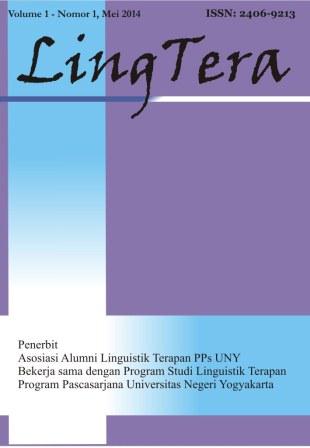English department students’ perceptions of utilizing social media for learning English
DOI:
https://doi.org/10.21831/lt.v12i1.71189Keywords:
social media, student perceptions, English language learning, informal language learning, technology-enhanced learningAbstract
This study investigates how English department students perceive the use of social media for learning English. A mixed-methods approach was employed, combining quantitative and qualitative data collected through questionnaires and structured interviews. A total of 88 students from several universities in Indonesia completed a 22-item questionnaire distributed via Google Forms, and three of these respondents were selected for follow-up interviews conducted via WhatsApp. Questionnaire responses were analyzed statistically, while interview data were examined using Miles and Huberman’s flow model. The findings indicate that students generally hold positive perceptions of using social media to support independent English learning. YouTube was identified as the most frequently used platform. Students reported that social media helps improve their comprehension, vocabulary development, and pronunciation, and described the experience as enjoyable and motivating beyond the classroom setting. Despite these benefits, students also encountered obstacles such as poor internet connectivity, concerns over data privacy, and exposure to inappropriate content.
References
Al Arif, T. Z. Z. (2019). Indonesian university students’ perception and expectation towards ICT use in learning English as a foreign language. Indonesian Journal of English Language Teaching and Applied Linguistics, 4(1), 133–145.
Creswell, J. W., & Plano Clark, V. L. (2011). Designing and conducting mixed methods research (2nd ed.). Sage Publications.
Jalal, A. Z. (2012). The use of social networking in education: Challenges and opportunities. World of Computer Science and Information Technology Journal, 2(1), 2221–274.
Kaplan, A. M., & Haenlein, M. (2010). Users of the world, unite! The challenges and opportunities of social media. Business Horizons, 53(1), 59–68.
Khaloufi, A., & Laabidi, H. (2017). An examination of the impact of computer skills on the effective use of ICT in the classroom. Indonesian Journal of EFL and Linguistics, 2(1), 53–69.
Kotler, P., & Keller, K. L. (2016). Marketing management (15th ed.). Pearson Education.
Makodamayanti, S., Nirmala, D., & Kepirianto, C. (2020). The use of digital media as a strategy for lowering anxiety in learning English as a foreign language. Journal of Cultural, Literary, and Linguistic Studies, 4(1), 22–26.
Miles, M. B., Huberman, A. M., & Saldana, J. (2014). Qualitative data analysis: A methods sourcebook (3rd ed.). Sage Publications.
Muetia, S. (2021). Student perceptions of the use of social media for learning English (Undergraduate thesis, Syarif Hidayatullah State Islamic University Jakarta). https://repository.uinjkt.ac.id/dspace/bitstream/123456789/54725/1/Muetia%20Safitri_FITK_Watermark.pdf
Murray, D. E. (2005). Technologies for second language literacy. Annual Review of Applied Linguistics, 25(1), 188–201.
Nasrullah, R. (2016). Media sosial, perspektif komunikasi, budaya, dan sosioteknologi. Simbiosa Rekatama Medika.
Rahman, J. (2017). Pengaruh media sosial bagi proses belajar siswa. Kementerian Agama Kalimantan Selatan. https://kalsel.kemenag.go.id/files/file/artikelprakom/15162891659956.pdf
Siniscalco, M. T., & Auriat, N. (2005). Questionnaire design: Quantitative research methods in educational planning. International Institute for Educational Planning/UNESCO. http://unesdoc.unesco.org/images/0021/002145/214555e.pdf
Sugiyono. (2016). Metode penelitian kualitatif, kuantitatif dan R&D. PT Alfabet.
Thiphachanh, N., & Widyastuti, P. (2020). The effectiveness of using films in the teaching of listening to improve the students' learning achievement and enhance the students' learning motivation. LingTera, 7(1), 61–71. http://journal.uny.ac.id/index.php/ljtp
Zam Zam Al Arif, T. (2019). The use of social media for English language learning: An exploratory study of EFL university students. Metathesis: Journal of English Language, Literature, and Teaching, 3(2), 224–233.
Downloads
Published
How to Cite
Issue
Section
Citation Check
License
Copyright (c) 2025 Syifa Amalia Silmi Alhaqi, Neti Hartati

This work is licensed under a Creative Commons Attribution-ShareAlike 4.0 International License.
LingTera allows readers to read, download, copy, distribute, print, search, or link to its articles' full texts and allows readers to use them for any other lawful purpose. The journal allows the author(s) to hold the copyright without restrictions. Finally, the journal allows the author(s) to retain publishing rights without restrictions.
- Authors are allowed to archive their submitted articles in an open-access repository.
- Authors are allowed to archive the final published article in an open-access repository with an acknowledgment of its initial publication in this journal.

Psychology, Evaluation, and Technology in Educational Research is licensed under a Creative Commons Attribution-ShareAlike 4.0 International License.
Based on a work at https://petier.org/index.php/PETIER.









